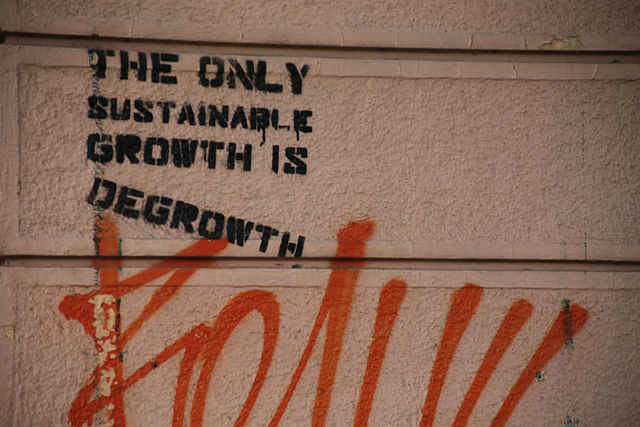
Please Follow us on Gab, Minds, Telegram, Rumble, GETTR, Truth Social, Twitter
Reprinted with permission•Mises Wire•Lipton Matthews
The assimilation of degrowth ideas into the mainstream portends dire consequences for economic well-being. Degrowth is trumpeted as the solution to averting a climate catastrophe, but it will reverse the economic fortunes of practitioners. Sustained economic growth became the norm recently in history, and surely most people don’t want a return to a preindustrial era with episodic growth and lower living standards. The typical person today would be reluctant to trade the luxuries of economic growth for the trinkets that a less dynamic society affords.
Despite the effusive praise for degrowth, it is difficult to take proponents seriously because they lack a frame of reference. Upper-class intellectuals in rich countries shouldn’t be recommending degrowth because they have never been confronted with poverty. The track record of economic growth in reducing poverty and ameliorating living standards is exceptional, so automatically measures to curb economic growth will worsen the plight of humanity.
Proponents are forgetting that economic growth improves the environment over the long term, especially in richer countries possessing better institutions and high human capital levels. Rising incomes raise environmental consciousness because prosperity affords people time to invest in the environment. Growing affluence also leads to safer service jobs that don’t entail plundering the physical environment. Degrowth advocates are unaware that their recommendations revert society to an agriculturally based economic system that requires greater land use. Increasing reliance on agriculture hampers the goal of curtailing pollution since agricultural production is a primary contributor to atmospheric pollution.
Furthermore, degrowth advocates are unaware that the present trend is for carbon emissions to be divorced from economic growth. Economic growth is being decoupled from carbon emissions in rich and developing countries. During 2007-19, emissions decreased by 15% despite rising gross domestic product per person. Like America, Australia and Israel recorded lower emissions, notwithstanding higher growth rates. Moreover, rather than a reliance on green energy, the transition to a lower carbon economy has been expedited by the shift from manufacturing to services. Less energy-intensive jobs in the service sector now account for a larger share of jobs in rich countries. Germany, America, and Mexico all observed a decline in manufacturing from 2007-19.
Even more contradictory is the assumption that degrowth is the path to environmental sustainability. However, the irony is that innovations generated by the free-market economy will limit dependence on fossil fuels and coal. Without market-based innovations, there can be no alternative to energy sources condemned by degrowth activists. Another problem is that lower growth strips countries of the ability to invest in climate adaptation technologies. Diminished growth indicates that entrepreneurs and other actors won’t have sufficient resources to build the technologies to cut the emission of harmful gases.
Degrowth makes societies more vulnerable to pollution and poverty. Further, some theorize that degrowth could worsen environmental deterioration by compelling companies to substitute expensive though cleaner production technologies for cheaper but more polluting technologies. Although the degrowth movement is gaining momentum, its claims are disavowed by empirical evidence. Indeed, the proposals of degrowth advocates are likely to injure the well-being of society. For example, renewable energy technologies are promoted as eco-friendly; however, the evidence shows that the material footprint of these sources is greater than fossil fuels.
Scientist Mark P. Mills argues that building solar and wind systems necessitates approximately a tenfold increase in the total tonnage of common materials to produce an equivalent quantity of energy compared to constructing a natural gas or a hydrocarbon-charged power plant. More significantly, the minerals to build renewable technologies are acquired by the environmentally contentious process of mining. Not only do renewables entail pollution, but they are also expensive, intermittent, and struggle to compete without subsidies.
Policies advocated by the degrowth movement to decarbonize are so ruinous that Christopher Marquis in an essay defending degrowth conceded that these proposals are impractical:
“‘Green hydrogen’ is produced using renewable electricity, but the process is expensive and an inefficient use of renewable resources. Carbon capture and storage (CCS) technologies are complex, expensive, and technically difficult to implement; many early schemes have been abandoned.”
Meanwhile, critics argue that the degrowth movement is irrelevant because we already live in an era of degrowth, and we don’t like it. Professor Wim Naudé suggests economic decline is a feature rather than a bug of civilization, and we are entering a period of economic stagnation. Economic growth is slowing in Western countries to the chagrin of societies, so serious politicians must outline a road map for growth instead of entertaining the inanities of delusional activists. Obviously, chasing degrowth is not a laudable goal because slow growth is becoming the norm, and it has not benefited the globe.
Subscribe to our evening newsletter to stay informed during these challenging times!!